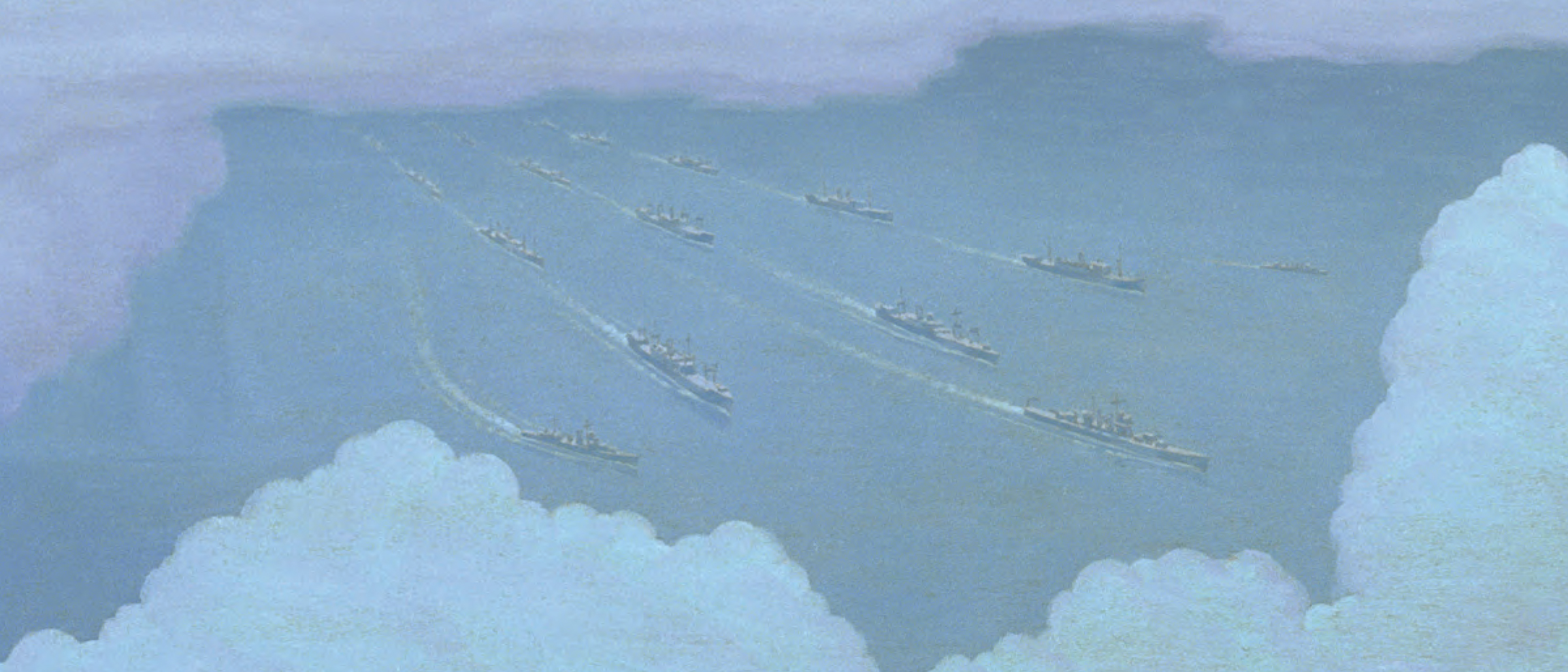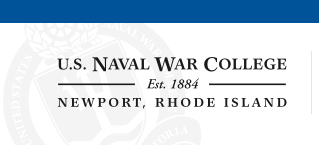
Historical Monographs
The historical monographs in this series are book-length studies of the history of naval warfare, edited historical documents, conference proceedings, and biographies based wholly or in part on source materials in the Historical Collection of the Naval War College. They are managed by the Maritime History Department in collaboration with the Naval War College Press.
-

HM 32: New Interpretations in Naval History
Benjamin "BJ" Armstrong
Selected papers from the twenty-first McMullen Naval History Symposium held at the U.S. Naval Academy, 19–20 September 2019.
-

HM 31: New Interpretations in Naval History
Brian VanDeMark
Selected papers from the twentieth McMullen Naval History Symposium held at the U.S. Naval Academy, 14–15 September 2017.
-

HM 30: Reflections on Naval History: Collected Essays
John B. Hattendorf
Reflections on Naval History: Collected Essays, by John B. Hattendorf, Ernest J. King Professor Emeritus of Maritime History, Naval War College, is the third in a series of volumes that bring together scholarly writings originally published in a variety of specialized journals and other publications, many of which are obscure and difficult to access. It includes papers originally appearing in the years 2010–20. The earlier volumes are Naval History and Maritime Strategy: Collected Essays (2000), and Talking about Naval History: A Collection of Essays (2011). The latter volume also appeared under the imprimatur of the Naval War College Press.
-

HM 29: New Interpretations in Naval History: Selected Papers from the Nineteenth McMullen Naval History Symposium Held at the U.S. Naval Academy, 17–18 September 2015
James C. Rentfrow
The nineteenth McMullen Naval History Symposium took place at the U.S. Naval Academy on 17–18 September 2015. In what was yet another record for attendance, over 250 scholars representing eleven countries shared 126 papers in forty-two panel sessions.
-

HM 28: To the Java Sea: Selections from the Diary, Reports, and Letters of Henry E. Eccles, 1940-1942
John B. Hattendorf and Pelham Boyer
The three-year span between 1940 and 1942 was critical in Henry Eccles’s life and career. These years mark not only the beginnings of the direct involvement of the United States in World War II but also Eccles’s first surface warship command, the command that earned him high professional recognition—the Navy Cross and the Silver Star. The diary, reports, and letters assembled here allow the modern reader an unusual opportunity to enter a very different world and a very different time in naval history. The contents document Lt. Cdr. Henry E. Eccles’s trip by passenger ships from New York to Manila, doing some intelligence work for the Office of Naval Intelligence along the way, and his assumption of command of John D. Edwards in the Asiatic Fleet, under Adm. Thomas C. Hart. The volume ends with Eccles’s participation, now a commander, in the short-lived Allied force in Southeast Asia—the American-British-Dutch-Australian, or ABDA, Command—and his subsequent experiences in the battles of Badoeng Strait and the Java Sea in February 1942, engagements in which Henry Eccles earned his combat decorations.
-

HM 27: Major Naval Operations in European Waters, 1939–1945
Milan Vego
This work is the second and last sequel to Major Naval Operations, published by the Naval War College Press in 2008 as Newport Paper 32. The first sequel, Major Fleet-versus-Fleet Operations in the Pacific War, 1941–1945, was published (as Historical Monograph 22) by the Naval War College Press / Government Printing Office in 2014; a second edition came out in 2016. The focus of that volume was on the description and analysis of three major fleet-versus-fleet operations. In contrast, this work, Major Naval Operations in European Waters, 1939–1945 (twenty-seventh in the Naval War College Press’s Historical Monograph series), looks at three different types of major naval/joint operations: an attack on enemy maritime trade, the defense and protection of friendly maritime trade, and a major amphibious/anti-amphibious operation. The principal purpose is to impress on commanders and their staffs the critical importance of studying the theory and practice of major naval/joint operations. Another purpose is to present a method for analyzing a historical case study from an operational instead of a tactical perspective, and then drawing appropriate conclusions and identifying operational lessons.
-

HM 26: The Hattendorf Prize Lectures, Volume 1: 2011–2019
Evan Wilson
Let this volume serve three purposes. First, it is an example of naval history done well. All the essays were written by distinguished scholars, and they demonstrate the best of the field. They look beyond operations, integrating sea power into larger frameworks; they revel in complexity, rejecting simple explanations; and most of all, they ask the right questions. The lectures also demonstrate the enduring relevance of sea power theory. Mahan is not enough, but—thanks in part to the prize laureates—no one is suggesting that he is. Understanding the parameters of the historical debates, as well as their limitations, is essential for all those interested in naval history.
-

HM 25: New Interpretations in Naval History
Lori Lyn Bogle and James C. Rentfrow
Selected Papers from the Eighteenth McMullen Naval History Symposium Held at the U.S. Naval Academy 19–20 September 2013.
-

HM 24: Blue versus Purple
Hal M. Friedman
The U.S. Naval War College, the Soviet Union, and the New Enemy in the Pacific, 1946.
-

HM 23: New Interpretations in Naval History
Marcus O. Jones
Selected Papers from the Seventeenth McMullen Naval History Symposium Held at the United States Naval Academy, 15–16 September 2011.
-

HM 22: Major Fleet-versus-Fleet Operations in the Pacific War, 1941–1945
Milan Vego
Major naval operations represent an area of study of operational art that Western naval theoreticians and planners have generally neglected. Too much emphasis is given instead to advanced technologies and tactics of weapons, at the expense of combined-arms tactics. The absence of an immediate and serious threat at sea today should not be allowed to prevent the development of sound naval theory and doctrine and the training of naval forces to prepare, plan, and execute major naval/joint operations as part of land campaigns in the littorals or a maritime campaign.
-

HM 21: Blue versus Orange
Hal M. Friedman
"The U.S. Naval War College, Japan, and the Old Enemy in the Pacific, 1945–1946."
-

HM 20: New Interpretations in Naval History
Craig C. Felker and Marcus O. Jones
Selected Papers from the Sixteenth Naval History Symposium Held at the United States Naval Academy 10–11 September 2009.
-

HM 19: Talking about Naval History: A Collection of Essays
John B. Hattendorf
This collection is divided into parts that deal with four major themes: the broad field of maritime history; general naval history, with specific focus on the classical age of sail, from the mid-seventeenth century to the end of the Napoleonic Wars in 1815; the wide scope of American naval history from 1775 to the end of the twentieth century; and finally, the realm of naval theory and its relationship to naval historical studies.
-

HM 18: To Train the Fleet for War: The U.S. Navy Fleet Problems, 1923-1940
Albert A. Nofi
Dr. Nofi’s work is a major contribution to our historical understanding of the interwar period in American naval history. In this volume he examines and describes in detail each of the “fleet problems,” discussing the issues raised and the resulting conclusions in the individual fleet exercises.
-

HM 17: Digesting History: The U.S. Naval War College, the Lessons of World War II, and Future Naval Warfare
Hal M. Friedman
This book is a study of how a military–academic institution—in this case the United States Naval War College (NWC)—attempted to readjust to a peacetime period that simultaneously entailed the start of a new type of conflict for the United States, namely, the Cold War, and the advent of a revolutionary new weapon, the atomic bomb.
-

HM 16: Three Splendid Little Wars - The Diary of Joseph K. Taussig, 1898-1901
Joseph K. Taussig and Evelyn M. Cherpak
The Spanish-American War, the Philippine Insurrection, and the Boxer Rebellion occurred over a hundred years ago. Scholars have produced a spate of books treating the Spanish-American War, the Philippine Insurrection, and the Boxer Rebellion. Personal accounts of service in the Spanish-American War have been published as well, yet fewer for the latter two conflicts. The unpublished diaries of Joseph K. Taussig, who participated in all of these conflicts, are therefore a uniquely valuable personal account of his wartime experiences.
-

HM 15: The Memoirs of Admiral H. Kent Hewitt
H. Kent Hewitt and Evelyn M. Cherpak
Memoirs as sources fill an important gap in the historical record. They tell us how an individual lived, what he did, and what he thought about how he lived and what he did. Such are the memoirs of H. K. Hewitt, admiral in the United States Navy, whose active duty career spanned the first fifty years of the twentieth century, including World War I and World War II, when he played a leadership role in the Allied invasions of North Africa and Southern Europe.
-

HM 14: An Admiral's Yarn
Harris Laning and Mark Russell Shulman
Harris Laning served as an officer in the United States Navy from 1891 to 1937. As well as anyone, he represents the men who built up the service into the world's greatest maritime fighting force.
-

HM 12: The Queenstown Patrol, 1917 - The Diary of Commander Joseph Knefler Taussig, U.S. Navy
Joseph Knefler Taussig and William N. Still
Professor William N. Still, Jr., has chosen to mark a turning point in U.S. naval history. The diary is more than interesting and colorful information about the wartime exploits of a distinguished U.S. naval officer, and it is even more than the "insider's" narrative of an operational challenge amply fulfilled.
-

HM 13: Doing Naval History - Essays Toward Improvement
John B. Hattendorf
The hull of the old ship of naval history, stripped of her tackle and ornament may well be food for worms, but the subject on which naval historians focus should not be overlooked or lost. It can appear again in a new model, corrected and amended by a new breed of historians, who work with wider viewpoints and on firm intellectual foundations. Along those lines, the essays in this volume provide some valuable insights and offer stimulating ideas on new approaches that promote excellence in doing naval history.
-

HM 11: Ubi Sumus? The State of Naval and Maritime History
John B. Hattendorf
This book of essays had its origin in a two and a half-day joint Yale-Naval War College conference held in New Haven, Connecticut, at the invitation of Professor Paul M. Kennedy. This conference was limited by time and resources to focusing on the naval and maritime history of only eight countries: Canada, France, Germany, Italy, Netherlands, Spain, the United Kingdom, and the United States.
-

HM: 10: Mahan is Not Enough
James Goldrick and John B. Hattendorf
The Proceedings of a Conference on the Works of Sir Julian Corbett and Admiral Sir Herbert Richmond.
-

HM 9: The Influence of History of Mahan
John B. Hattendorf
The Proceedings of a Conference Marking the Centenary of Alfred Thayer Mahan's "The Influence of Sea Power Upon History, 1660-1783."
-

HM 8: The Fraternity of the Blue Uniform
Richard G. Colbert, Allied Naval Cooperation, and Joel J. Sokolsky
Admiral Richard G. Colbert's particular approach to U.S. naval strategy, placing as it did great emphasis on the need to enhance cooperation between the U.S. Navy and friendly maritime forces, was not entirely different from the maritime strategy of the 1980s.

